- Why I Used Grok + Gemini and ChatGPT to Build My Outreach List (And How Recruiters Can Too) - January 22, 2026
- The Diversity & Inclusion Glossary — A List of 300+ Helpful Diversity Terms (2026 Update) - January 19, 2026
- Why You Need a Job Description Revision Tracker (Before Your Next Audit) - January 9, 2026
600+ people a month search “KSA examples” on Google. So I felt compelled to share some examples and shed some light on what KSA means.
As your organization grows, it becomes a challenge to know what you’re looking for as you hire to expand your teams. So this leads to hiring unqualified talent. And recruiting candidates with fewer skills than you’re looking for.
One way to navigate these challenges is by putting in place the KSA model(knowledge, skills, and Abilities). These KSA elements are important in helping you identify the capabilities required for different job positions.
So, in this post, we’ll guide you through:
- A definition of a KSA – the acronym widely used for Knowledge, Skills, Abilities
- Importance of KSA
- 10 KSA examples from different sectors
- The difference between “Knowledge, Skills, Abilities” and “Knowledge, Skills, Attitudes”
- How to identify KSAs for your roles
- A free KSA template (just copy/paste)
What does KSA mean?
KSA means “Knowledge, Skills, Abilities.” KSAs are a list of specific qualifications and attributes a candidate must possess to be a good fit for a job being advertised. So, let’s break each of the 3 words down and look at some knowledge, skills, and ability examples:
“Knowledge” – this is the information a candidate has at their disposal that applies to a job role or job function. So, this information usually relates to procedures. “Knowledge” might include things like:
- Regulations – knowing laws and regulations relevant to a position
- Chemical knowledge – knowing how certain chemicals interact and how to work with them safely
- Filing – knowing systems of data storage
“Skills” – skills are developed through training or experience. Therefore, a skill requires managing information, people, or things to reach an outcome. They’re also sometimes described as hard or soft skills. So, some examples of “Skills” are:
- Computer programming
- Content creation
- Leadership
Examples of hard skills:
- Computer programming
- Data analysis
- Project management
- Accounting
Examples of soft skills are:
- Time management
- Leadership
- Communication
- Public speaking
- Problem-solving
“Abilities” – taking a skill and using it to perform a task. Abilities and skills are often used interchangeably, but there is a subtle difference. So, here are some examples of “Abilities”:
- Ability to organize and prioritize
- Knowing how to communicate and delegate
- Ability to work autonomously and as part of a team
Note: Knowledge, skills, and abilities make up “competencies.” Read more about competencies vs. skills in our post, Skills vs Competencies…are they the same?
Importance of KSA
KSAs are essential for several reasons such as:
- Well-outlined job expectations
By including specific KSAs, you write clear job descriptions and role responsibilities. This helps potential candidates self-assess if they’re qualified before applying. Thus, this saves you time and helps you attract the best-qualified talent.
- Objective assessments
With KSAs, you get a structured framework for evaluating your applicants. So this leads to non-biased objective hiring decisions.
- Easier screening of candidates
Depending on your organization, you can ask candidates to address the KSAs listed in your job post in their cover letters. So, this way, you can screen unqualified applicants before the interview process.
- Developing recruitment criteria
With KSAs, you’ll easily determine the important qualities, skills, and knowledge the candidates must possess. So, this way, you’ll easily write the skills that the candidates can’t proceed without and the ones they can proceed without.
Now imagine a growing technology startup looking to recruit a product designer. Traditionally, they focused on technical skills such as the software the designer can use. However, challenges such as designers struggling to work with developers in fast-paced projects arose.
By incorporating KSAs into the recruitment process, the tech startup can specify more than the technical qualifications. They can also list other important skills such as agile development, and abilities such as teamwork and adaptability.
This hiring approach ensures they hire a product designer who is technically knowledgeable and also fits well with the other teams.
So this leads to better project outcomes, increased teamwork, and reduced turnover.
Now, on to the examples.
Examples of Knowledge, Skills, and Abilities
Here are 10 example KSAs from different industries:
KSA Examples for Medical Support Assistant — US Veterans Health Administration
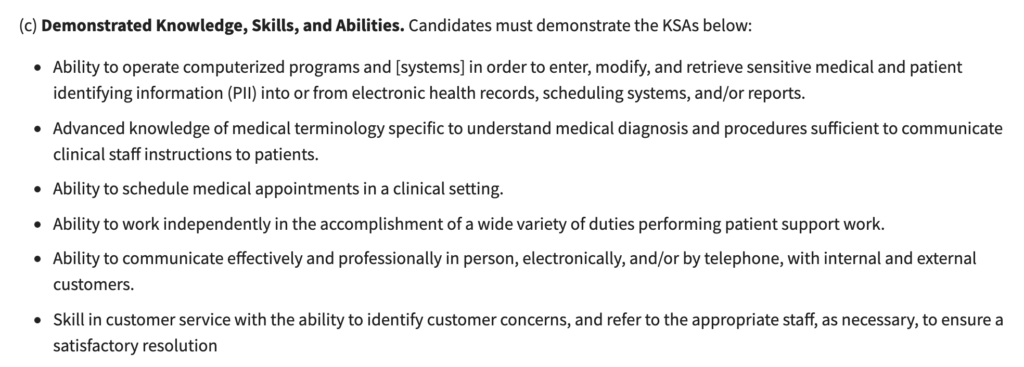
Supervisor’s KSA examples — Rock County
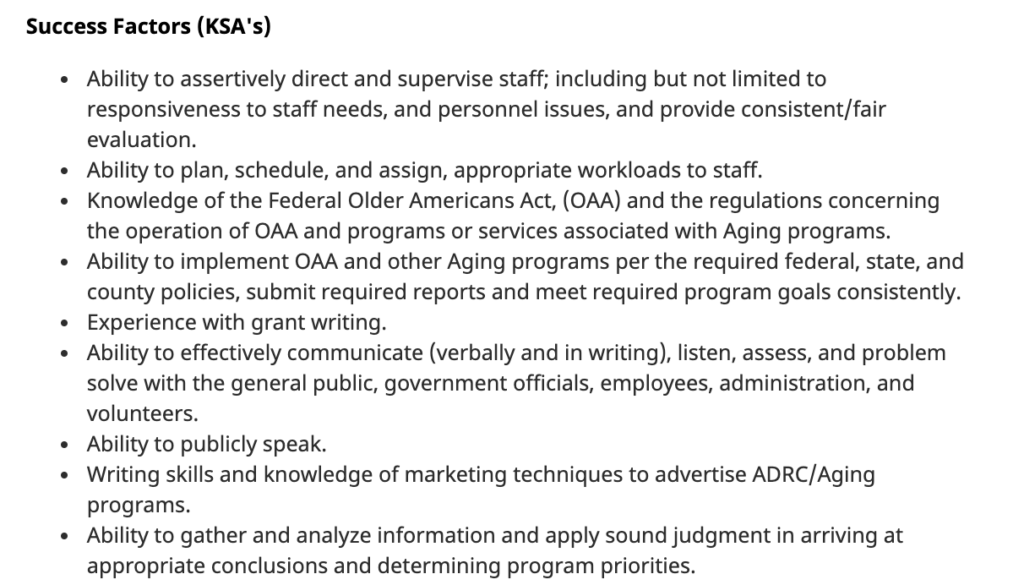
KSA examples for Nursing — University of Central Oklahoma

Social Workers’ KSA Examples — Carteret County
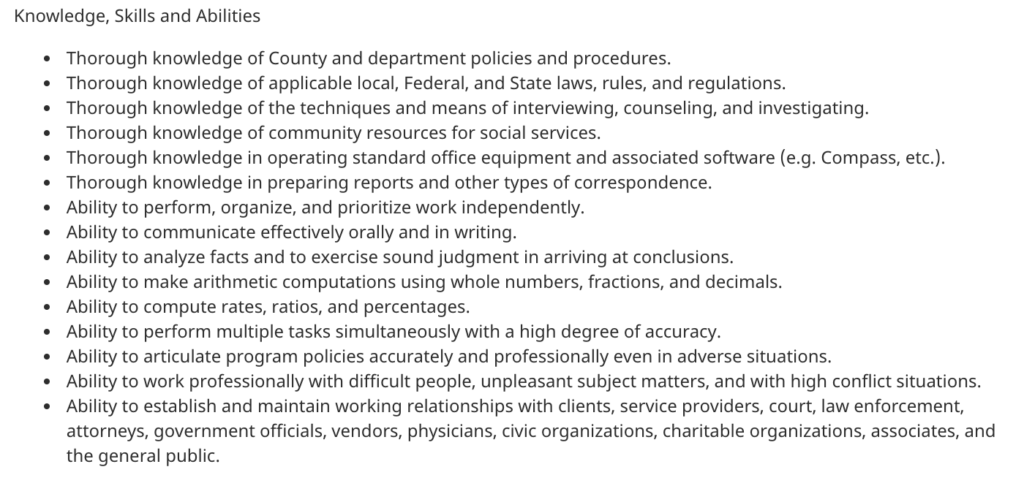
KSA Examples for Administrative Assistant — James River Church
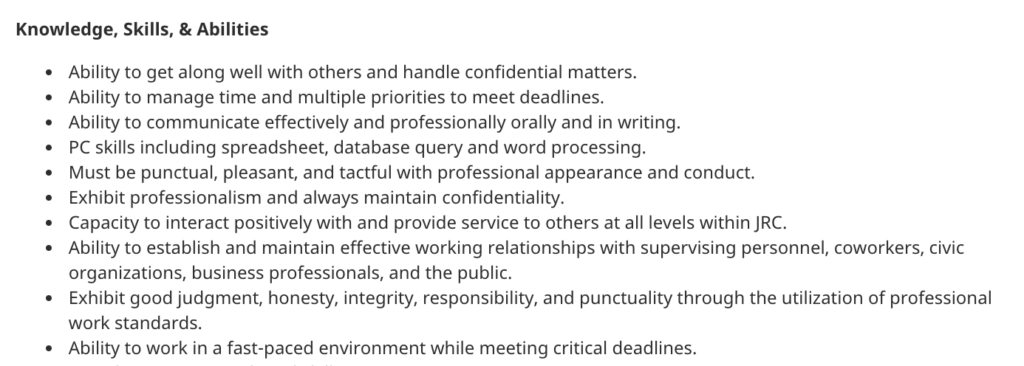
Insurance Rep KSA Examples — OU Health
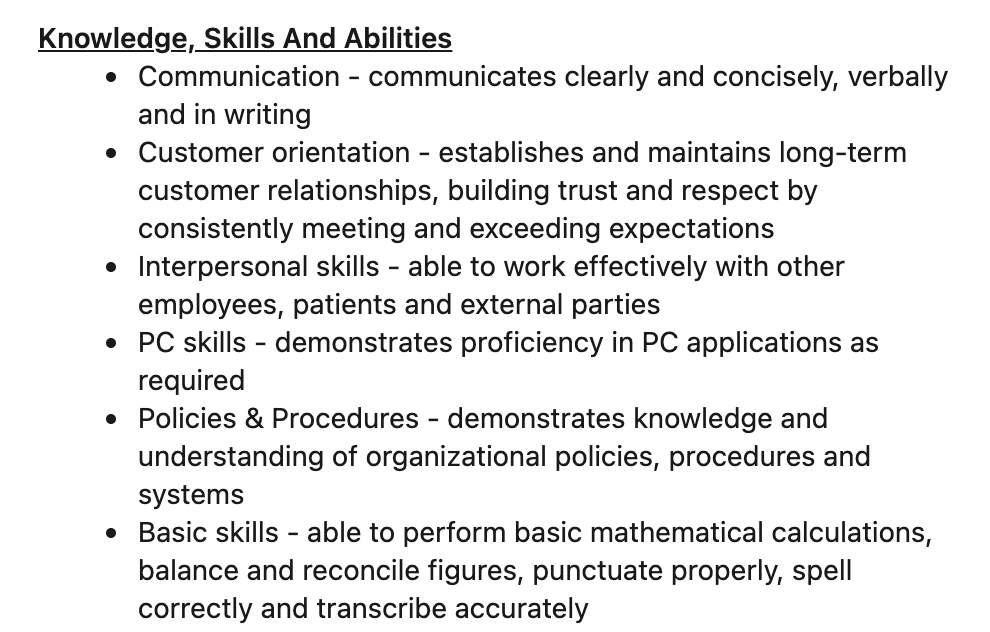
Knowledge Skills and Ability Examples for Data Entry — eMoney Advisor

Career Navigator KSA Examples — City of Baltimore
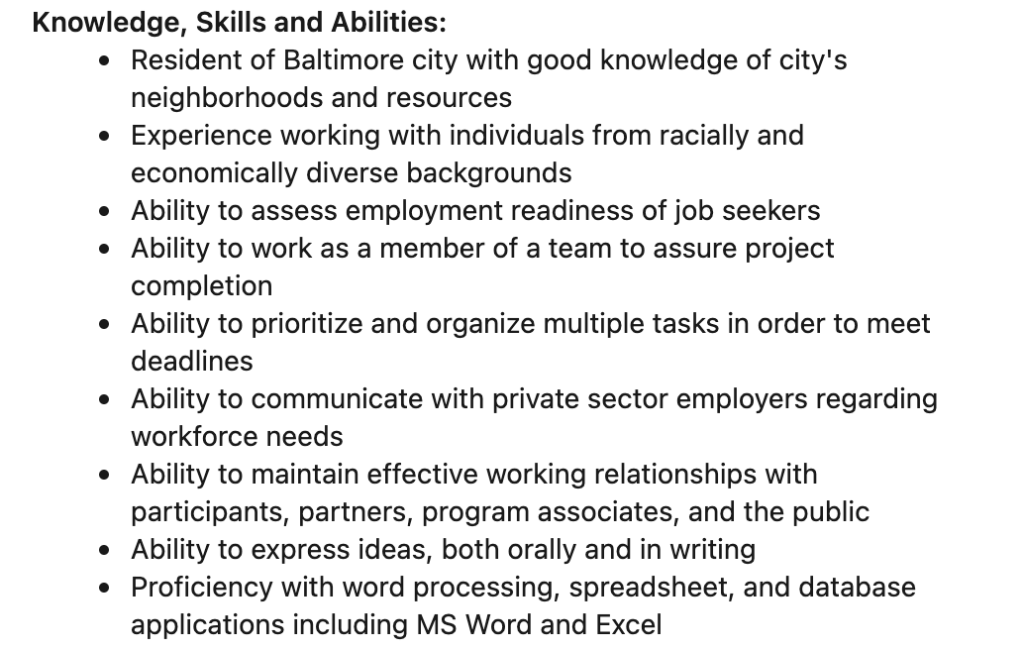
KSA Examples for Postal Supervisor — from USPS and FedEx
The above KSA examples can help you get started creating your own Knowledge, Skills, and Abilities sections in your job descriptions. But, some organizations use KSAs as an examination tool, like the United States Postal Service (USPS). So, here are 2 FedEx/USPS KSA examples:
And a search for “ksa examples for postal supervisor” gave me this example from FedEx:
Can the “A” in KSA mean “Attitudes”?
Knowledge, Skills, Attitudes is an alternative meaning of the acronym KSA. In this usage, the definitions for “knowledge” and “skills” are the same. But, the “A” refers to Attitudes and describes an applicant’s feelings or emotional behaviors.
This definition of KSA is not as widely used, and it might be more appropriate to use the KSA examples given in this article as your guide. But, if you feel the role you’re advertising would benefit from listing specific attitudes, make sure to use the entire phrase “Knowledge, Skills, Attitudes” instead of “KSA” to avoid confusion.
Here are some examples of Attitudes:
- Valuing other team members’ hard work
- Being motivated to support others
- Appreciating good customer relations
How to Identify KSAs for Your Open Roles
Follow the steps below to identify KSAs for your job openings:
-
Examine required knowledge
Identify specialized education and necessary information. So, for an IT role, you could identify important technical knowledge such as familiarity with networking basics, cybersecurity, and operating systems.
Plus, check if the role requires specialized education and certifications such as a specific IT certification, or a computer science degree.
-
Identify important skills
Consider soft and technical skills for daily work tasks. For instance, for a sales manager position, you might identify necessary technical skills such as expertise in CRM software.
And soft skills such as customer relationship management, negotiation ability, and also effective communication
-
Determine abilities required
Evaluate important abilities for the job opening success. For example, for a project manager position, evaluate for abilities such as leading teams under pressure, meeting project timelines, and multitasking.
-
Seek input from multiple sources
Get diverse perspectives from various stakeholders such as colleagues, and team members. For instance, to refine the KSA statement for a customer success manager, get feedback from supervisors, team members, and even customers. So, use surveys or whichever method you require for feedback collection to know what makes a successful customer success manager in your company.
-
Update and edit your KSAs as roles change
The job description of a role is bound to evolve. So regularly review and update your KSAs to include any emerging knowledge or skills needed for the current position.
-
Document your KSAs
To ensure alignment and clarity with organizational expectations, document and communicate KSAs. So, document the KSAs for different roles, detailing each required proficiency.
Therefore, by following the above steps, you can easily identify the KSAs necessary for each position in your company. This also leads to better recruitment decisions and a competent workforce.
Pro Tips
While coming up with KSAs, prioritize the important elements to determine the non-negotiable items for your recruitment. So, for instance, ask yourself these questions?
- Is this KSA an important element the candidate must have? Or can they learn on the job?
- Is this KSA critical to fulfilling the specific job function duties
- Does this job opening have to start with this KSA criteria on the first day?
- Have we hired an employee before who didn’t meet this criteria?
Free KSA Template Format [just copy and paste!]
Here’s a KSA Template you can copy and paste for your job postings. It’s based on an opening for a Talent Acquisition Specialist. Therefore, the KSAs will vary depending on the role you’re hiring for, but the layout can stay the same. So, just copy, paste, and add on any KSAs for your role:
Knowledge, Skills, and Abilities (KSA’s):
Knowledge:
- Solid knowledge of sourcing, recruitment, interviewing
- Working knowledge of HR legal compliance
- Experience in employee record-keeping
Skills:
- Recruitment skills supporting several business units
- Excellent time management skills
- HR project management skills
Abilities:
- Sourcing and engaging industry-related talent.
- Providing performance consulting to senior management.
- Using Human Resources Information Systems.
Pro Tips: Keep your list of KSAs short and organized. Organizing your KSAs into 3 lists makes it easier to read, which is great for people with Dyslexia…AND shorter lists of KSAs might not deter women from applying. Studies also show women usually don’t apply for jobs unless they fit every requirement in a job posting.
Shout-outs:
- Knowledge, Skills and Abilities (KSA): Definitions and Examples (by Indeed Editorial)
- Knowledge, Skills and Attitudes (by The Peak Performance Center)
- The Importance of KSA’s (Knowledge, Skills and Abilities)in the Federal Application Process (by Up4KSA sourced by CDC HRMO)
Why I Wrote This?
Ongig’s mission is to transform job descriptions. If you’d like to see how Ongig can help you optimize your JDs when it comes to KSAs (and more!), please request a demo of Ongig’s Text Analyzer.
